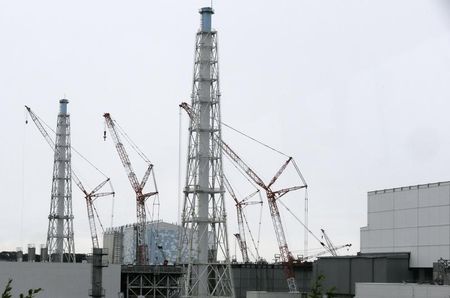By Aaron Sheldrick and James Topham
TOKYO (Reuters) - Japan's biggest utilities are blocking most new solar and other renewable energy from transmission grids, stirring concern among green power advocates that Japan favours restarting idled nuclear plants at the expense of other fossil-free supply.
Seven out of Japan's 10 regional power monopolies have blocked further grid access for renewables, saying new supplies would strain distribution systems, and that solar and wind energy are not reliable enough for uninterrupted power flows.
The action compounds concerns about the prospects for renewables since it also comes as Japan's Ministry of Economy Trade and Industry (METI) has cut incentives for solar projects, despite Tokyo's pledge to maximise green power to curb fossil fuel imports after the Fukushima crisis shut the nuclear sector.
METI has formed a working group that is meeting for the first time this week to investigate the action by utilities, but the ministry has not escaped criticism from renewables advocates.
"A combination of METI and the nuclear lobby is trying to kill the solar power industry," said Seth Sulkin, President and CEO of Pacifica Capital KK, a Tokyo-based solar power and commercial real estate developer.
The ministry denies this, and Prime Minister Shinzo Abe in a policy speech last month said Japan's goal was still to use renewable energy sources to the "greatest extent possible".
Oil, coal and gas imports have cost Japanese utilities an extra $28 billion a year since the 2011 earthquake and tsunami that set off the world's worst nuclear disaster in 25 years, eventually prompting the shutdown of all of Japan's reactors.
Japan in 2012 proposed increased reliance on renewables as a way to cut the added costs, but while some reactors are likely to come back onstream next year, new renewable projects are getting shut out.
Tokyo Electric Power Co and Kansai Electric Power Co, Japan's two biggest regional utilities, said they had cut access to those power sources on parts of their grids due to a lack of capacity.
Other utilities, including Kyushu Electric Power Co, have stopped accepting new supplies, except for household solar.
"If the entire renewables amount already applied for was connected it would cause power production to surpass what our customers use," said Yuka Otsubo, a spokeswoman for Kyushu Electric, which also said it was concerned that fluctuating solar supplies could cause blackouts.
A METI renewables official said the working group looking at the barring of renewables from power grids needed to promptly check and confirm what the electricity firms were saying.
Industry sources say Japan's grid could handle renewable input of up to 10 percent, although utilities have not said publicly how much they can take.
HIGH TARIFFS, BIG PLANS
In 2012, Japan introduced a feed-in-tariff (FIT) scheme requiring utilities to purchase all electricity generated from renewables at guaranteed rates for set periods.
The rates promised were among the highest in the world for renewables, and this led to a rush of proposals. By April 30 this year, the government had approved 71 gigawatts of capacity under the scheme, according to METI's latest data, more than 95 percent from solar projects.
Only about 14 percent of the approvals have been connected to utility grids, but that has been enough to raise renewable supplies - excluding hydroelectric - to almost 3 percent of power output from 1 percent before the Fukushima disaster.
But the high number of solar projects has alarmed the government about the extra cost to power bills, especially in rural areas that are support bases for the ruling party, according to a source who was briefed on the matter by an aide to Prime Minister Abe this month.
Solar power can cost up to 38 yen ($0.36) per kilowatt-hour (kWh) to produce, more than three times the cost of nuclear power at about 9 yen per kWh, according to a METI study in 2011.
If all the proposed renewables projects were hooked up, about $25 billion a year would be added to power bills, according to one estimate.
Despite this, public opposition to nuclear restarts and support for renewable tariffs remain high, according to opinion polls.
CUTTING SOLAR INCENTIVES
METI has cut the guaranteed fees for solar supplies each year since green power incentives were introduced in 2012 and this month moved to tighten rules on guaranteed payments for larger solar projects, according to local media.
The FIT scheme faces a three-year review starting this month, and some people in the industry are expecting further moves by METI to curtail solar power, even possibly abolishing the guaranteed feed-in rates for sun-powered projects.
"The operation of nuclear power is fine, but as a result I worry that renewable energy will be restricted," Kenji Araki, an executive at solar developer West Holdings, said in an email.

($1 = 107.10 Japanese yen)
(Editing by Tom Hogue)
